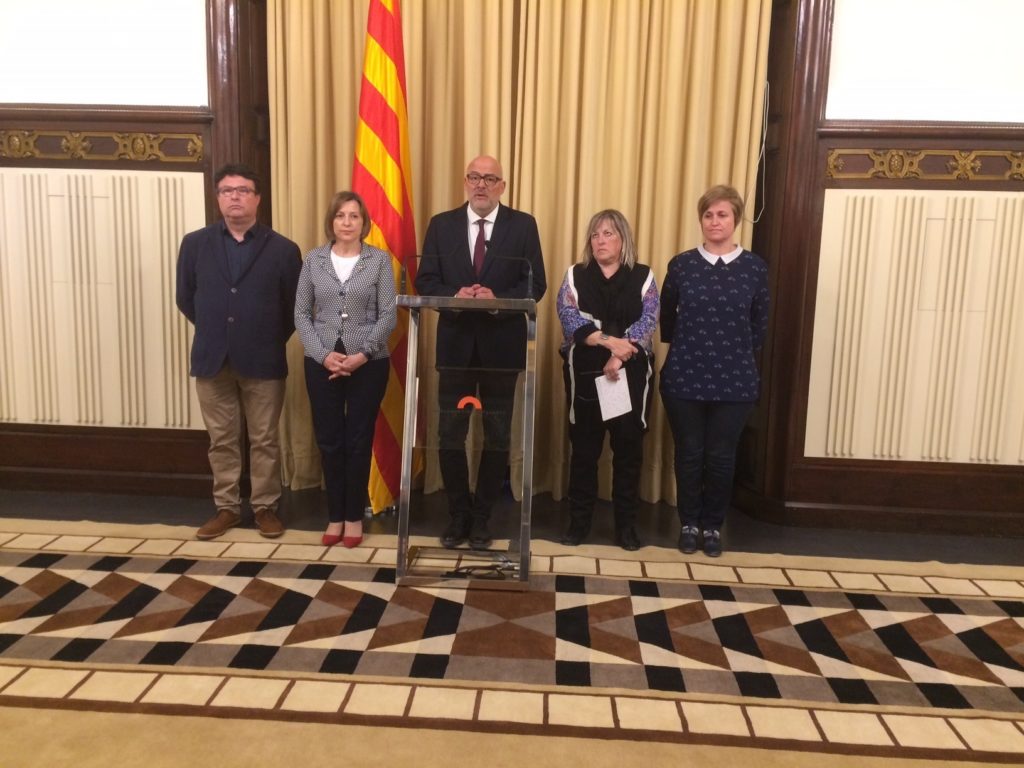12.05.2017 - 12:36
|
Actualització: 12.05.2017 - 13:05
La Conselleria d’Afers Exteriors de la Generalitat de Catalunya ha enviat un memoràndum a governs, parlaments i organismes internacionals denunciant la persecució judicial continuada contra la presidenta del parlament, Carme Forcadell.
El document es titula ‘La persecució continua’ i assegura que el procés judicial amenaça la separació de poders i posa en risc qualsevol projecte democràtic a l’estat espanyol. Argumenta que Catalunya defensa la llibertat d’expressió i la capacitat política dels parlaments democràtics per a debatre i votar sobre posicions polítiques de qualsevol tipus i lamenta que el govern del PP violi la protecció parlamentària portant Forcadell als tribunals.
El text també fa referència a la reforma del Tribunal Constitucional (TC) i destaca que els càrrecs contra Forcadell provenen dels ‘nous poders polititzats que el govern espanyol va atribuir’ al TC. Aquests poders li permeten anar més enllà de la resolució de qüestions constitucionals i executar les seves pròpies resolucions a través de tribunals ordinaris amb multes i inhabilitacions si els acusats decideixen no complir amb els dictàmens.
El memoràndum fa un repàs cronològic al cas Forcadell, incloent-hi la seva primera declaració el desembre passat. Recorda que milers de persones de la societat civil la van acompanyar fins al Tribunal Superior de Justícia de Catalunya amb pancartes denunciant que el cas era un atac contra les institucions democràtiques de Catalunya.
La Generalitat també explica que Forcadell va demanar que es posposés la seva segona vista, celebrada el dilluns passat, al·legant falta de temps per preparar la seva defensa, d’acord amb el que estableix el Tribunal Europeu de Drets Humans, i que la seva petició va ser denegada.
Finalment, el document recorda que més del 80% dels catalans està a favor de decidir el seu futur a través d’un referèndum i afegeix que d’altres membres de la mesa del parlament també han estat citats a declarar per haver permès que es votés la resolució sobre el referèndum al Debat de Política General del parlament el desembre del 2016.
Ací podeu llegir el memoràndum que ha fet públic el govern català.
‘Catalan Parliament president’s persecution continues’
‘On 14 December 2016 Spain’s Constitutional Court decided to send to courts a case against Carme Forcadell, President of the Parliament of Catalonia. The case charges that on 27 July 2016 President Forcadell committed neglect of duty and contempt of court by allowing a debate and vote on the Catalan parliament approving the conclusions of a parliamentary commission created to study a constituent process that would shape a future independent state. The study of a possible constituent process is just one option that was being studied democratically and responsibly by the Catalan Parliament.
The charges against President Forcadell stem from new highly politicised powers granted to the Constitutional Court by Spanish Government. According to the reform, the Constitutional Court has the ability to go beyond ruling on constitutional issues, and to execute their own rulings via ordinary courts that can fine and suspend public officials from holding office for years if they decide they failed to carry out the Constitutional Court’s rulings. This means a serious threat to the separation of powers between the Executive and the judicial branches of the Spanish government that is the foundation of the rule of law in Spain.
President Forcadell was firstly called to testify last December before the High Court of Justice at the investigation phase of the legal process against her. Thousands of people from civil society accompanied President Forcadell to court, carrying signs that decried the case as an affront to Catalonia’s democratic institutions. She stated at that time that it is her obligation to facilitate democratic debate in Catalonia’s parliament, since Parliament is the place where people expect issues of major importance must be discussed. She said convinced she would do the same again to defend democracy and Catalonia’s institutions.’



